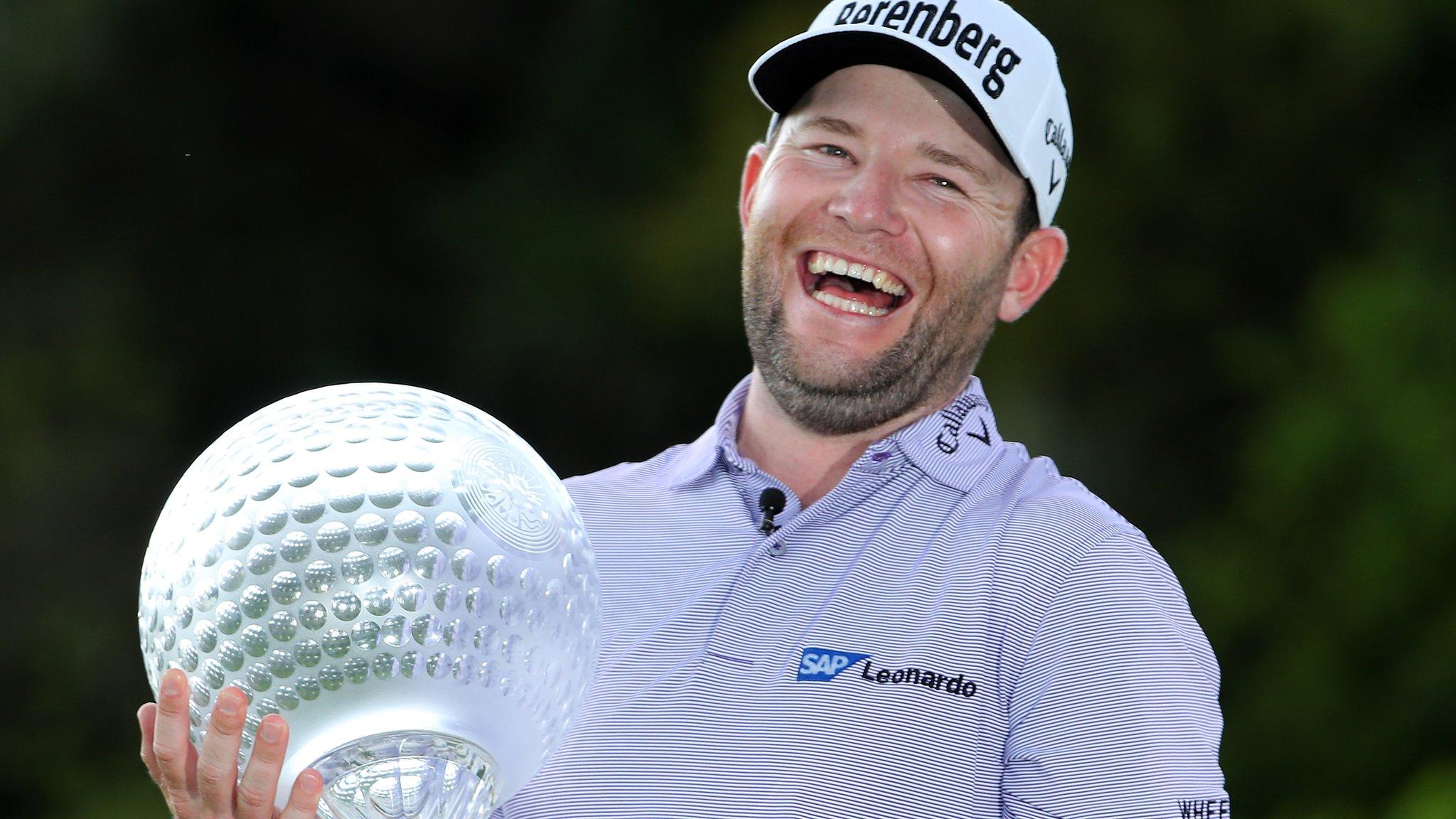An inch shorter and 27 operations later, golfer Marc Cayeux's comeback continues
- Published
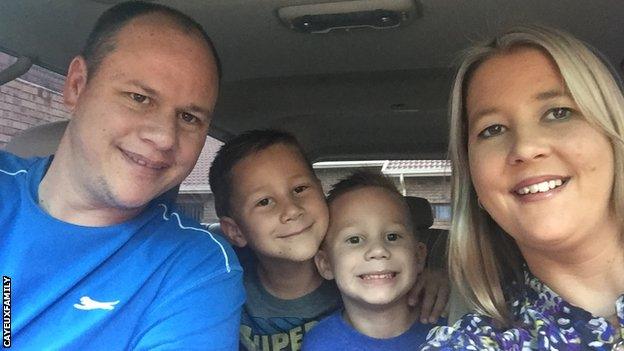
Marc Cayeux with sons Ross and Jason and wife Jana
Marc Cayeux's right knee was shattered and his left foot "left dangling" as he was carried from a burning vehicle on a stretcher made of branches.
The Zimbabwean golfer - once in the world's top 200 - was not given proper pain relief for 18 hours, a dose of Paracetamol the only antidote for a wounded limb doctors wanted to amputate.
Twenty-seven operations have left him an inch shorter, his world ranking has fallen more than 1,500 places, and the "stab wound-like hernia" on his right hip is an everyday reminder of his life-changing car crash in September 2010.
After seven weeks in intensive care, three months in hospital and four years learning to walk again, Cayeux has defied the predictions of doctors and physiotherapists to return to professional golf.
"It would be nice to have a pain-free day, but the reality is it's not going to happen," he says. "I have to just get on with things."
And that is exactly what the Lancaster-born 39-year-old is doing, making a cut earlier this month for the first time since his return to Africa's Sunshine Tour and targeting another at Mauritius in a fortnight.
Cayeux talks BBC Sport through his horrific crash and the mental and physical barriers he has overcome in a seven-year journey back to professional sport.
'I'm not going to die like this'
It was September 2010 when an oncoming police truck hit a cow in the road, swerved into Cayeux's path and crashed head-on into him.
He was returning to his parents' home in Zimbabwe after collecting a new vehicle, having sold both his cars to help cover medical bills after his dad had a stroke.
"Driving in Zimbabwe at night is very dangerous. The way people drive, the condition of cars, never mind the roads and animals on the roads," says Cayeux, who left England before his first birthday and now lives in George, South Africa.
"I bounced off both the airbags. The seatbelt did a lot of damage, ripped my abdominal wall just above my hip on the right side - in hospital they had to cut me open and sew it back to my hip bone."
Cayeux was unconscious for about half a minute, but came round to hear his friend - who was driving a vehicle in front - calling his name and warning the overturned car was on fire.
"I remember saying to myself: 'I'm not going to die like this,'" he adds. "I moved my right leg and it was instant pain.
"I tried to move my left leg. It felt OK until I tried to push my body along the roof of the car. I did half a sit-up, lifted my leg and saw my foot dangling. It was quite a painful sight - a lot goes through your mind."
An 18-hour journey to pain relief
Cayeux clambered to safety through a rear passenger door and was carried to his friend's vehicle on a stretcher made of branches.
It took four hours to reach Zimbabwe's capital Harare, in part because police were unwilling to let him leave the scene before a report was compiled.
Given makeshift splints for his legs as his friend drove to meet the ambulance halfway, it would be 18 hours before he received proper pain relief.
"It was quite excruciating pain," Cayeux says. "The only thing they could give me was happy gas - I finished the canister.
"When we met the ambulance they didn't have any morphine. They gave me Paracetamol tablets, which was quite depressing."
Cayeux feared doctors would "take the easy option and amputate my left foot" and was relieved to be airlifted to South Africa.
"I was trying to save my foot, which was a very big concern," he adds. "My brother told the doctor I was a professional golfer and needed my foot."
Learning to walk again
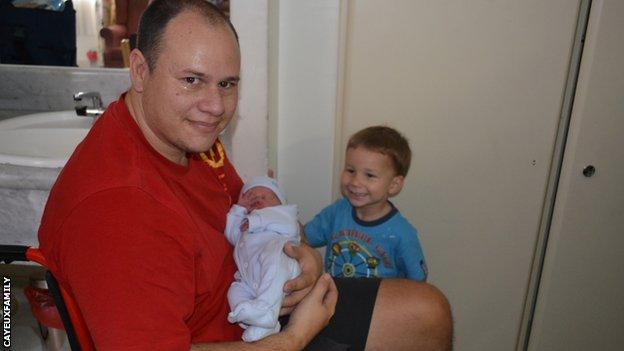
The Cayeuxs' second son, Jason, was born in May 2011
Cayeux spent seven weeks in intensive care, had "countless operations" and contracted MRSA, meaning he was put in an isolation ward and unable to see two-year-old son Ross.
Things got tougher for the Cayeux family when Marc's pregnant wife Jana miscarried one of the twins she was carrying.
"Every day you feel every minute, you can't wait for visiting hours to see people and try to get your mind off the situation you are in," adds Cayeux.
"The hardest thing was when my brother came in and told me Jana had miscarried and was in hospital.
"I was in the ward, couldn't walk. I was so frustrated, I really tried to get out of bed, go see her and be there for her, because she was by my side all the way. I felt very hopeless."
After three months, he returned home. But he had little muscle in his legs, spending six weeks in a wheelchair and four years on crutches as he learned to walk again in a hydro swimming pool.
A series of operations on his right femur meant that leg was an inch shorter than his left.
He says: "I told the doctor: 'I don't want to walk around the golf course in circles.' So we shortened the left femur. Now when I fly economy class I have more leg room.
"The inch I've had off doesn't really affect me. Dealing with the pain is another thing. I don't really notice it until I get asked to grab something on a higher shelf and my fingertips are an inch away."
'Your body has beat you, you won't make it back'
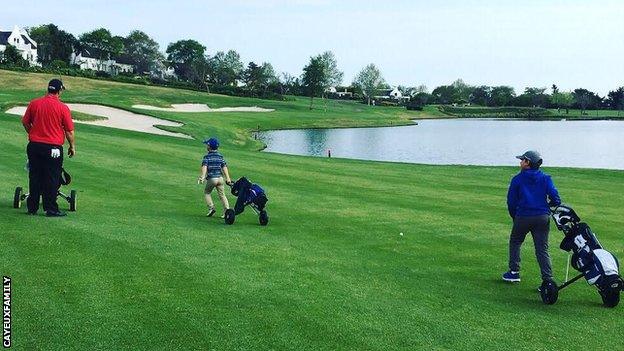
Cayeux plays at Fancourt near his home in George, and says he is grateful for the club's support
Cayeux has now been walking for three years and three months, but has had a golf club in his hand since he could stand on one crutch.
"I saw a physiotherapist and she told me: 'Your body has beat you too much, you won't make it back.' I said: 'If I had to take your word, I'll never know.' It kind of spurred me on to prove her wrong."
But it wasn't just the physical recovery Cayeux needed help with. He had post-traumatic depression and saw a psychologist.
He says: "It took me a month to say: 'Yeah, I do need help.' You are recovering and think you're on the right road. You think about things positively, but the hardest thing is staying positive.
"When I learned to walk in a pool, I was going in on my crutches, complaining about pain, until I saw a guy my age in a wheelchair with no legs. It makes you realise, I am lucky with what I have.
"I stood there going, 'I am going to do this. I have to get back walking and I can get back to golf.'"
'I want to soak up what I can'
Cayeux was playing on the European Tour before his accident in 2010 and says he is indebted to the organisation's support, as well as that of compatriot Tony Johnstone.
"I had no insurance," he said. "Financially, I wouldn't be able to try and get back on the Tour, never mind play a friendly round of golf."
He played several tournaments at the beginning of the year, but was frustrated with his performance and opted to take time off to work on his reinvented game.
It worked - Cayeux finished tied 30th at the Vodacom Origins of Golf Final two weeks ago.
"It's hard for me to miss tournaments when I have been missing them for seven years," adds Cayeux.
"The mind remembers and knows what to do, but it's a different experience having to deal with what I have physically. I've lost yardage and I play with all these young guys that can hit it a mile."
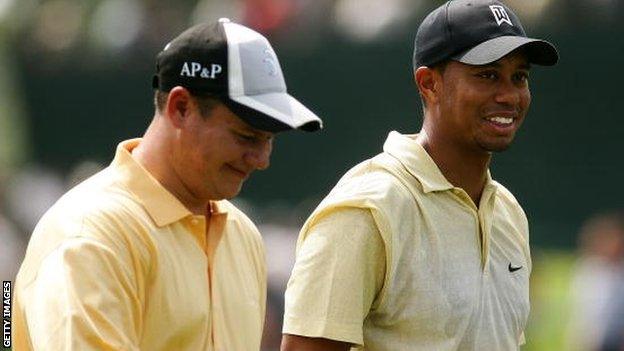
Cayeux, who was once ranked inside the world's top 200, played alongside former world number one Tiger Woods at the 2005 WGC-NEC Invitational
He adds: "When I practise, I'm limited to the amount of golf balls I can hit. I try to stay off the pain medication, I need to give the body a bit of a break.
"I will probably practise for two or three hours. If I'm playing 18 holes I will take a cart, just so I don't have to take medication to go walking - as much as I need to walk to get the physical strength."
Before his accident, Cayeux was paired with Tiger Woods at the 2005 WGC-NEC Invitational and competed at The Open in 2009. He takes inspiration from Ben Hogan, who recovered from a car crash to win the 1950 US Open., external
Cayeux turns 40 next year and at some point needs an operation on a hernia he calls "a little uncomfortable" rather than painful, but admits he is "under no pressure to perform".
"I want to still get out there and enjoy it, soak up what I can," adds Cayeux.
"Next year I will start setting some goals. My wife Jana has been my rock, and it is by God's grace that I am here."
- Published14 November 2017
- Published14 November 2017
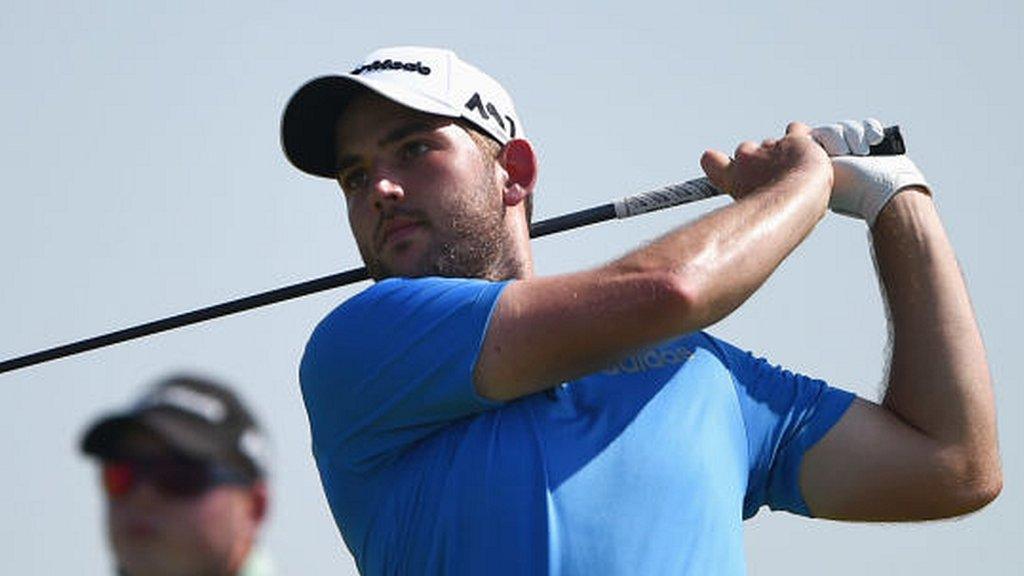
- Published12 November 2017
